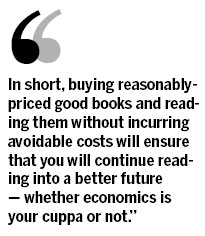Comment
Reading between the lines of book buying
By Jamal Nasser (China Daily)
Updated: 2010-06-25 09:55
 |
Large Medium Small |
Close to 206,000 books were published in the UK in 2005; US and China followed with 172,000 and 136,266 in 2005 and 2007 respectively. With so many new books and so little time, time-poor book enthusiasts might be having trouble with the marginal analyses of their book-related costs and benefits in the face of the scarcity that some simply understand as "not enough time".
In layperson's terms, marginal analysis refers to weighing the benefits against the costs of any extra action. In this case, will buying our next book delight us with more benefit than the costs that we bore to find, buy and read it? And what is an economically sound way of doing this in Beijing?
First, there is the search cost: the time it took us to go to the bookstore, find our book after wasting some more time in the bookstore, and finally, transportation to and from the bookstore, if any. Then there is the money cost, or the price of a book. And finally, the opportunity cost of reading, or whatever gains we lost in the time we spent reading. These are the costs.
How do the benefits measure up? Benefits are subjective to short and long runs, and, of course, never remain the same. That is, benefits change more often and faster than the costs we mentioned earlier.

One way to deal with this uncertainty is to deal with what is certain. For instance, ignoring benefits for a while, it would make sense to lower our costs as much as safely and rationally possible. Another possibility is to increase our benefits when the costs are static or stable; and the best one of all would be to minimize costs and simultaneously maximize benefits. Let's sum these as improving the finding, selecting and reading processes.
For instance, some excellent books can be found in the most unexpected of places. Wangfujing bookstore has a fine and ever-changing collection of reasonably priced contemporary business and titles (hardback Jeffrey Archer there for only 46 yuan, compared to 8o-yuan Archer paperbacks elsewhere). Another favorite, Xidan Book Mansion's third floor, carries English language classics that cost from 10 to no more than 30 yuan, works from Bennett, Ruskin, Stevenson, even Bacon's Organon, while the ground floor offers Penguin Classics at a discount rate of 55 yuan, a delicious collection including treasures like Choderlos de Laclos's Dangerous Liaisons, Defoe's Roxana, and George du Maurier's Trilby to name a few. By the way, Penguin Classics cost around 100 yuan and up elsewhere in Beijing. So, the trick is to bookscan several stores at least once a week to find good deals and rare gems.
Choosing a good book is rather subjective; still, reading a few pages from random locations helps. If time is limited, the author's photo can be useful. For example, no need to pick a book if the author's photo is not pleasing somehow. In the absence of author's photo, reading the introduction and author's bio would reveal enough to make an informed decision about the mind and experience behind the book.
Not to dispense with general reading advice here in this short space, but in a strictly economic sense, daylight reading is best - to minimize eye strain. The other cost-preventing measures include but are not limited to comfortable armchairs from IKEA, and of course enough sleep, proper nutrition, regular exercise and weekly writing to maintain a ready mind. These protect against fatigue, lower-back pain, and mental deterioration - avoidable costs, to be sure.
In short, buying reasonably-priced good books and reading them without incurring avoidable costs will ensure that you will continue reading into a better future - whether economics is your cuppa or not.